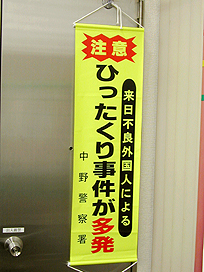 No, this isn’t one of the signs I see when I take my dog walks, nor did I even take this photo. I lifted it from the Mainichi Daily News website, the English online presence of the Japanese newspaper Mainichi Shinbun. The MDN is using the photo to accompany their headline story, “Only 30 percent of Japanese feel foreigners suffer discrimination”.
No, this isn’t one of the signs I see when I take my dog walks, nor did I even take this photo. I lifted it from the Mainichi Daily News website, the English online presence of the Japanese newspaper Mainichi Shinbun. The MDN is using the photo to accompany their headline story, “Only 30 percent of Japanese feel foreigners suffer discrimination”.
I’m not sure what I found more chilling, the article detailing the recent government report on human rights which looked at Japanese attitudes toward foreigners in Japan, or the sign depicted in this photo. Before I get to the sign, however, here’s the gist of the report:
Of the 3,000 adult Japanese who were surveyed by the Cabinet Office for the report from late January to early February of this year,
* only 30.4% “believe treating foreign residents unfairly because of their nationality is a form of discrimination.” This is down 10 percentage points from the previous survey, conducted in 1997.
* only 54% “feel the need to protect foreign residents’ human rights at the same level as the natives.” Let’s reiterate that from the other angle: 46% of those surveyed believe the rights of foreigners living in Japan don’t need to be protected at the same level that Japanese’ rights are protected. The 54% figure is down from 65% who felt this way in 1997.
* 21.8% “believe foreigners should accept the fact that they do not have equal rights as Japanese.” 18.5% believed the same thing in 1997.
You’d have to be a pretty clueless foreigner not to realize that Japan is not the most hospitable country to its non-native residents, but nevertheless these figures really took me aback. Oh, and why the dramatic drop in Japanese attitudes towards foreigners? That old bugaboo, foreigner crime.
A Cabinet Office spokesman blamed the soaring crime rate for the public’s apparent lack of concern for their foreign guests. “The increase in the number of crimes committed by foreign nationals could be behind these figures,” the spokesman said.
Which leads me to the photo that accompanied the article and which I’ve reproduced here. The sign depicted, from Tokyo’s Nakano Ward, reads in Japanese:
chuui! rainichi furyou gaikokujin ni yoru, hittakuri jiken ga tapatsu
Which translates roughly to:
Be careful! Purse snatchings by foreign delinquents (hooligans) coming to Japan are occurring frequently.
A slightly clearer image of the same sign is available here. I found this link at The Community, an advocacy group “concerned about the treatment of non-Japanese in Japan.” This group was started by the well-known foreigners rights advocate — and now Japanese citizen — Arudou Debito. The Community site has a whole page about various signs put up by the Nakano City Police, and attempts to talk with city leaders about the misleading signs. Debito also has uploaded the text to two separate articles that appeared in the Asahi Shinbun last December about “foreigner crime” in Tokyo and whether or not there is really any substance to this oft-used bogeyman.
It’s funny, M commented on my post about signs for local dog owners that perhaps the Japanese who stare at me while I’m out walking the dog are thinking I stole the dog, and it made me chuckle. Seeing these signs, and reading the depressing results of this Cabinet Office survey, I’m not exactly laughing at the moment.
I wasn’t laughing too a couple of months ago when I was getting my hair cut, and I had to sit quietly and listen while my hairdresser went on and on about how America has so much crime because they allow all those immigrants in, and how Japan now has the same problem. My Japanese wasn’t good enough to refute her skewed perspective, nor give her a piece of my mind (probably a good thing!), but I did manage to tell her that my mother was one of those immigrants to America that she was referring to, which at least got her to shut up. I wonder if Kaika will ever have to invoke his father similarly, years from now.


